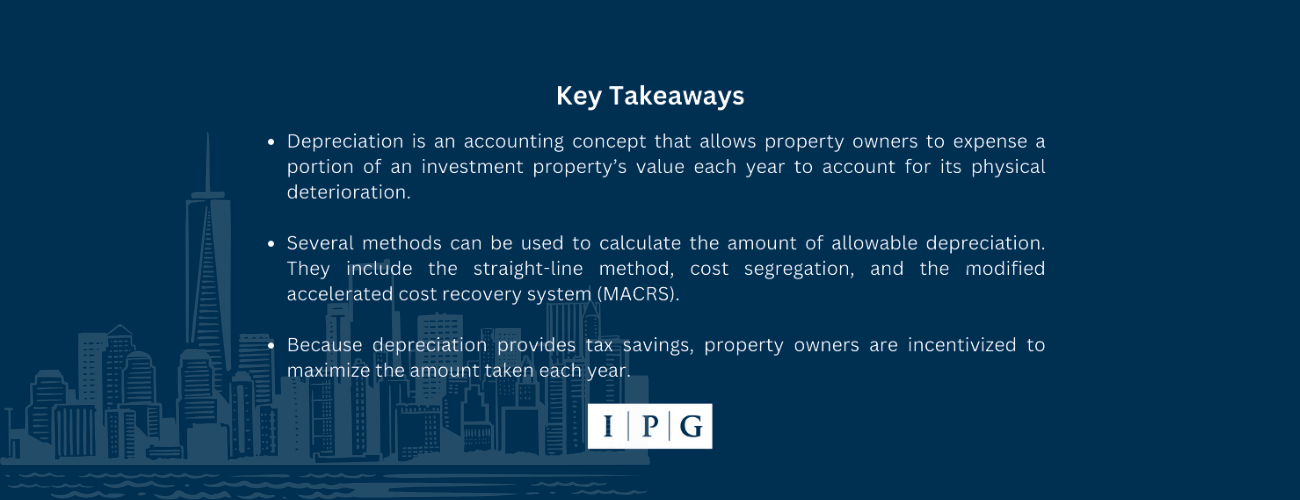Commercial Real Estate Depreciation Explained

Let’s demystify the concept of depreciation in commercial real estate – a key element for any broker, yet often seen as complicated. Depreciation is essentially about recognizing the natural aging and wear of a property over time. This concept is not confined to accounting; it significantly influences a property’s market value and the taxes it incurs.
In this guide, we’ll unpack the nuts and bolts of depreciation in an easy-to-understand manner. You’ll learn how it affects property value and investment returns, essential knowledge whether you’re just starting out in real estate or are an experienced broker. Join me as we turn this complex topic into a clear, practical tool for your real estate toolkit.
What is Real Estate Depreciation?
Under the existing U.S. Tax Code, assets in commercial buildings are subject to a straight-line depreciation over a period of 39 years, while those in residential properties can be depreciated over a 27.5-year straight-line period.
When someone spends their money for business purposes, the cost can usually be “written off” or decreased from the business’ final profits for tax purposes. Two main ways to reduce business expenses are:
- Money spent for an item that is immediately consumed
- Day-to-day costs of doing business, and
- Small-dollar purchases
By the term real estate depreciation we are referring to the long-term or temporal drop in property value, and it’s usually caused by several reasons, such as:
- Netting out after inflation periods
- Due to the aging and obsolescence of the building structure
- Temporary cyclical downturns in market values
- After routine capital maintenance
In the U.S., real estate depreciation in income-producing structures has been made from the perspective of income tax policy, given that asset value in accrual income accounting is based on historical cost and allows for depreciation to be deducted from taxable income.
Understanding Tax Benefits of Commercial Real Estate Depreciation
Tax Deductions and Depreciation Allowances in Commercial Real Estate
In the world of commercial real estate, one of the most significant advantages is the ability to leverage tax deductions and depreciation allowances. As properties age over time, they experience wear and tear, which results in a reduction in their value.
This decrease in value allows investors to claim depreciation deductions on their tax returns. Understanding and effectively utilizing these deductions can lead to substantial savings and increased cash flow for brokers and investors.
Bonus Depreciation vs. Regular Depreciation: Making Informed Choices
When it comes to depreciation, commercial real estate professionals have the option to choose between regular depreciation and bonus depreciation. Regular depreciation allows you to spread out the deduction over several years, while bonus depreciation allows you to deduct a larger percentage of the property’s value in the first year of ownership.
Weighing the pros and cons of each method is essential in optimizing tax benefits and aligning with investment goals. By carefully considering the implications of these choices, brokers and investors can make informed decisions to maximize their returns.
How Depreciation Affects Capital Gains Taxes: Planning for the Future
As commercial real estate properties appreciate in value over time, investors may face capital gains taxes when selling the property. However, the depreciation claimed over the holding period can offset some of these taxes.
Understanding the interplay between depreciation and capital gains taxes is critical for effective tax planning and determining the optimal time to sell an investment property. Strategic utilization of depreciation can minimize tax liabilities and increase overall profitability for savvy brokers and investors.

How Are Commercial Properties Depreciated?
First of all, there’s no way to predict (or know) when an asset will be “used up,” and how different asset classes in the same category can have different lifespans.
Over how many years is a commercial property depreciated?
To create a universally applicable process, depreciation periods for real estate have been set. For residential properties, depreciation period is 27.5 years, and for commercial real estate – it’s 39 years.
Land can not be depreciated – only the buildings can. The two most acceptable ways to determine the value of the land are:
- Property appraisal
- Tax assessment
For example…
Let’s say you’ve purchased an office building worth $1 million, and that the appraised value of the land now is $200,000. This means that the building value is $800,000. Divide this amount by 39, and you will be left with a $20,513 depreciation expense you owe for the property.
Here’s another example of why depreciation is such a major tax benefit for real estate investors:
If you buy a self-storage property for $1,500,000 (acquisition costs included), the assessment indicates that the land value is $500,000.
Now you have a depreciable cost basis of $1,000,000, and let’s say that the property brings you in $150,000 in rental income – over your first full year of ownership. You will have the following deductible expenses:
- Rental revenue – $150,000
- Property taxes – $15,000
- Management expenses – $50,000
- Insurance – $5,000
- Marketing costs – $5,000
- Other expenses – $10,000
- Income after expenses – $65,000
Commercial Building Depreciation Life
The commercial building depreciation life refers to the time period over which a commercial building’s value is assumed to decrease for tax and accounting purposes. This depreciation is used to allocate the cost of the building over its useful life, which reflects the wear and tear, obsolescence, and general decline in value that occurs as the building ages.
The specific depreciation life for commercial buildings can vary based on factors like the type of building, its intended use, and the applicable tax laws. In the United States, for example, commercial real estate is typically depreciated over 39 years for tax purposes under the Modified Accelerated Cost Recovery System (MACRS). However, certain components of the building may have different depreciation lives.
It’s important to note that while depreciation is a common accounting practice for tax purposes, it doesn’t necessarily reflect the actual market value of the building over time, which can be influenced by factors beyond just wear and tear. It’s advisable to consult with tax professionals or experts in real estate accounting to accurately determine the depreciation life for a specific commercial building.

Investment Perspective on Depreciation
Although tax policy is clearly important, it may have complicated or omitted considerations that are more important from a tax investment perspective.
What we are referring to as the investment perspective on commercial real estate depreciation is the perspective that reflects the fundamental economic performance of investments.
This perspective is the basis of capital allocation decisions that derive their financial value and opportunity cost. In the investment industry, profit or performance is measured by financial return metrics, most prominently – the internal and the total rate of return.
At the most fundamental level, real estate depreciation directly and importantly affect investment returns, apart from taxes.
Maximizing Depreciation Benefits
#1 Utilizing Cost Segregation Studies for Enhanced Depreciation
Commercial real estate investors can significantly accelerate depreciation benefits through cost segregation studies. These specialized studies help identify and classify various components of the property, such as fixtures, equipment, and improvements, that can be depreciated at a faster rate than the building itself. By reclassifying certain assets to shorter recovery periods, investors can increase their tax deductions and improve cash flow, providing a substantial advantage in the ever-competitive market.
#2 Taking Advantage of Improvement and Repairs Deductions
Another effective strategy for maximizing commercial real estate depreciation benefits is to leverage deductions for property improvements and repairs. Instead of capitalizing these expenses and depreciating them over time, investors can claim immediate deductions for qualifying repairs and maintenance expenses. By carefully documenting and categorizing these costs, brokers and investors can optimize their depreciation benefits and enhance their overall profitability.
#3 Timing Considerations for Depreciation and Property Sales
Strategic timing plays a crucial role in optimizing commercial real estate depreciation benefits and overall tax planning. Investors must be mindful of when they decide to make property improvements, incur expenses, and claim depreciation deductions. Timing property sales is also important to maximize depreciation recapture benefits and minimize potential tax liabilities. By aligning depreciation strategies with the right timing for property sales, brokers and investors can make the most of their tax advantages and financial outcomes.
#4 Depreciation Recapture: What Investors Need to Know
Understanding commercial real estate depreciation recapture is paramount for brokers and investors. When a property is sold, any previously claimed depreciation deductions may be subject to recapture, resulting in potential tax liabilities. Being aware of recapture rules and their impact on the overall investment strategy is essential for avoiding unexpected tax consequences. By staying informed and planning ahead, investors can make well-informed decisions and navigate the complexities of commercial real estate depreciation recapture.
Source of Depreciation: Income or Capitalization?
It is considered of great interest for investors to investigate the depreciation phenomenon and explore how much real estate depreciation is expected to change in the current net cash flow.
One property can generate cash flow as it ages, but it is also interesting to investigate how much of that income is due to the asset market’s reduction in the present value, and how much the investor is willing to pay as the building ages.
This phenomenon is referred to as “cap rate”. Understanding it can improve the accuracy of investment return, forecast and possibly improve the management and operation of commercial property depreciation.
IPG has been monitoring real estate depreciation because it could have substantial implications for our investors. While we can only speculate for now, what we do know is that billions of dollars in additional funding could be allocated towards projects aimed at establishing affordable housing.




